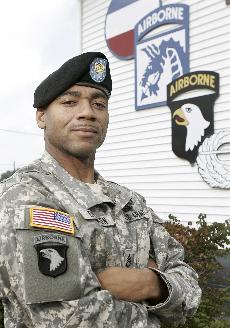Army benefits up recruits

The Associated Press The Associated Press
Aug 31, 2006
Last updated on May 12, 2016 at 04:11 a.m.
WASHINGTON – Staff Sgt. Michael Obleton has already done two tours in Iraq, dodging roadside bombs as he drove trucks in Army convoys across the hostile countryside.
He may even return to the front again – a possibility that never occurred to him when he first joined the active Army in 1997, long before the 2003 Iraq invasion and the onset of what has become an increasingly unpopular war.
Obleton knows about the Bush administration’s often-touted long war on terror, and he’s seen the Iraq insurgency up close. But he’s determined to continue the fight. Thursday he will stand by the flagpole at Kentucky’s Fort Campbell, raise his right hand, and swear once again to “support and defend the Constitution of the United States against all enemies.”
As he recites his oath of service, administered by the Army’s No. 2 ranking officer, Gen. Richard Cody, Obleton will become the 64,200th Army soldier to re-enlist this year – allowing the Army to meet its retention goal a full month before the fiscal year ends on Sept. 30.
Get The Daily Illini in your inbox!
“The Army is a good career, there are a lot of benefits,” he said this week from his post at Fort Campbell. “This is something I signed up for. It’s a job. The war doesn’t worry me.”
While the Army struggled last year to meet recruitment goals, it has been able to keep soldiers by using a growing list of incentives and bonuses to shower troops with money, schooling and career advancements.
So far this year, the Army has doled out an average bonus of $14,000, to eligible soldiers, equalling a total of $610 million in extra payments.
The re-enlistments are despite escalating casualties in Iraq- where more than 2,600 troops have lost their lives since March 2003. They have enabled the Army to meet its retention goal every year since 1998.
Both the Army National Guard and the Army Reserve expect to meet their re-enlistment goals for this fiscal year, which are 34,875 and 17,712, respectively. Both totals are slightly higher than last year’s goals.
The number of expected and confirmed re-enlistments dipped in 2003, the year the war began, but has increased since then.
It was the schooling opportunity, rather than a bonus, that was the attraction for Obleton, 35, originally from Columbus, Ga.
While much of his unit – the 594th Transportation Company attached to the 101st Airborne Division – may be heading back to Iraq, he plans to stay in Kentucky for now and attend school in order to become an Army career counselor.
“I’ve known this was going to be a career for me,” said Obleton, whose wife is also in the Army and intends to stay. “We made this decision together. We are both doing well and we’ve advanced in our careers.”
And once he finishes school, Obleton would be happy to make a third trip to Iraq.
“These are the things we’re trained to take on,” he said. “We’re still there. Our mission isn’t complete.”
Back in 1996 when he joined the Army reserves or a year later when he moved to the active Army, going to war wasn’t an issue. But in January 2003, he was sent to Kuwait and was among those first units traveling back and forth across the border into Iraq in Army convoys.
He was there for seven months and then went back in June 2004 for a full year. The second tour, he said, “was more intense. You felt the threat.” But, unlike many units, everyone in his company came back alive.
And once he finishes school, he would be happy to make a third trip to Iraq.
“These are the things we’re trained to take on,” he said. “We’re still there. Our mission isn’t complete.”





